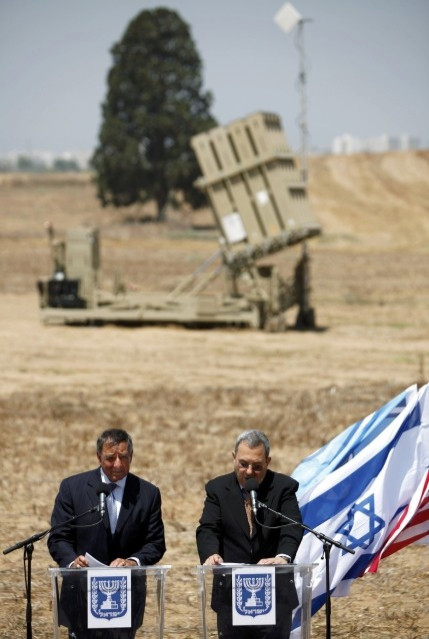Panetta's Visit To Israel Shows U.S. And Israel Still Don't Speak The Same Language On Iran

On the issue of Iran's nuclear program, even close allies have a hard time finding a common solution.
The U.S. is urging Israel to remain patient and let new diplomatic and economic pressure on Iran take effect.
Israeli leaders are adamant that the window of opportunity to take more decisive -- read: military -- action against Iran's nuclear infrastructure is closing quickly. They are likewise skeptical that any new sanctions, no matter how serious, will be able to prevent Tehran from translating its enrichment program into a full-fledged weapons program, something the Iranian regime has long denied it intends to do.
That difference of opinion between Washington and Tel Aviv has been impossible to miss as U.S. Secretary of State Leon Panetta makes his way across the Middle East, arriving in Israel on Tuesday.
In words that appeared tailored to appeal to Israeli restraint, Panetta told the press on Wednesday that "We have to exhaust every option, every effort, before we resort to military action."
"The international community has applied very strong sanctions against [the Iranians]. We have ratcheted up those sanctions. It's having an impact," said Panetta in Ashkelon, just north of the Gaza Strip.
The venue chosen for those remarks, located next to surface to air missiles designed to shoot down rockets and artillery shells, was undoubtedly intended to both intimidate and project an image of American and Israeli strength and resolve.
The secretary qualified that the U.S. was committed to military action, but only if sanctions and diplomatic efforts failed.
But the effect of Panetta's words was undercut every step along the way by messages from Israeli leaders.
Israeli Defense Minister Ehud Barak, who spoke together with Panetta in Ashkelon, warned that sanctions were a lengthy, possibly unreliable means of pressuring Iran. "It's important to notice that while sanctions are taking place and diplomacy is taking place, it takes time," said Barak. He added that within that waiting period "the Iranians are daily enriching uranium." "We clearly have something to lose by this stretched time," he added.
Hours later in Jerusalem, Israeli Prime Minister Benjamin Netanyahu, known for his hardline stance against Iran, gave an even more skeptical and blunt reply to new non-military efforts from Washington.
"Neither sanctions nor diplomacy have yet had any impact on Iran's nuclear weapons program," said Netanyahu. The Israeli PM warned that "We will not allow Iran to develop a nuclear weapon. Period." In a nod to Israeli hawks, who see the Iranian program as the development of an existential threat, Netanyahu noted that "Everything must be done to keep Iran, the world's most dangerous regime, from developing the world's most dangerous weapons."
Still, to longtime observers of the region, the new diplomatic exchange of words may well appear little different from past discussions between the allies.
Defense analysts say that any unilateral bombing of Iran from Israel would likely be seen as being approved by the U.S. in other countries in the region. Although Israel has attacked Iraqi and Syrian nuclear facilities in the past, Iran presents an altogether different challenge. The latter's more capable air force and air defenses (not to mention its farther distance) presents graver risks, even to Israel's renowned pilots. Israeli forces would need to transit over numerous other national airspaces to arrive in Iran, and the larger network of nuclear facilities in the country makes the effectiveness of any attacks much less certain.
Iranian retaliation in the aftermath of an attack, either by attempting to close the Straits of Hormuz, lob missiles at Israel, or to launch attacks through proxy non-state organizations, may nevertheless draw in the U.S. Amid an election year and uncertain times in Syria, less than a year after U.S. forces withdrew from Iraq and still face a tenuous time in Afghanistan (both by the way bordering Iran), America's political and national will for a new conflict in the Middle East may be at an all-time low.
Panetta remarked in Cairo before his departure for Israel that his trip was not intended to be a platform for exchanging plans for war, only discussions of "various contingencies and how we would respond" if Iran chose to build the bomb.
The issue of choice, of course, remains the major point distinguishing the Obama administration's views on Iran and those of its Israeli counterparts. For the latter, Iran's desire for the bomb is already a foregone conclusion.
"They have a choice to make," said the Defense Secretary on Wednesday. "If they make the decision to proceed with a nuclear weapon" the U.S. has "options that we are prepared to implement to ensure that that does not happen," said Panetta, alluding to the possibility of miltiary actions.
© Copyright IBTimes 2024. All rights reserved.





















